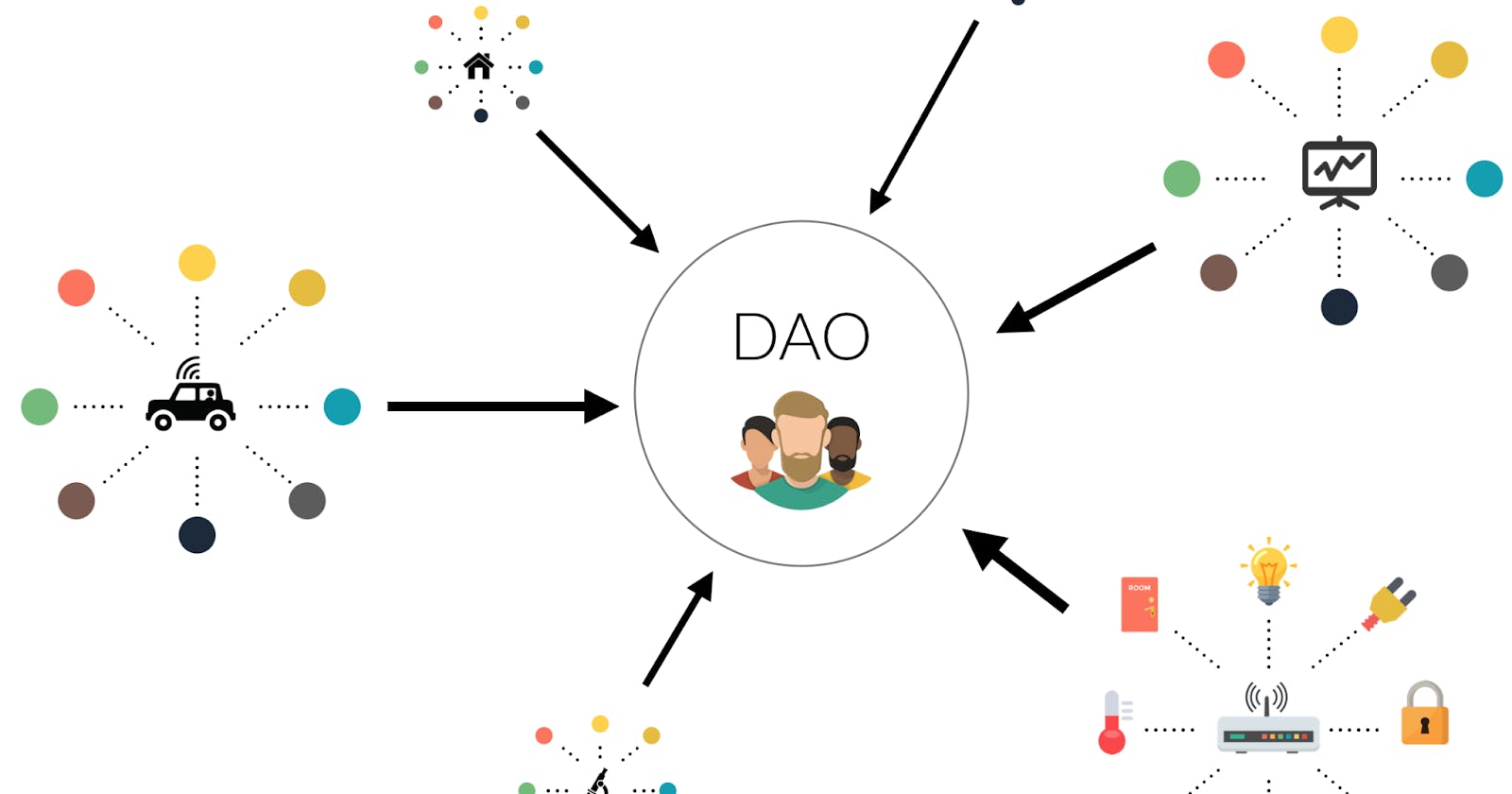Introduction
One of the most crucial features of cryptocurrency is its decentralization, which means that there is no central authority like the government or banks that control this system.
The overall control of cryptocurrency is divided among computers, nodes, and networks. These cryptocurrencies get an additional layer of privacy and security to global financial transactions most of the time. This process is superb as no one sees this type of security in standard – or fiat – currencies. Based on this awe-inspiring technology, a group of developers set up a decentralized autonomous organization or DAO in 2016. It was about creating an organization that functions effectively with zero central authority. And the project became hugely successful.
What is a DAO?
A DAO (Decentralized Autonomous Organization) refers to a management technique that has been in existence since the discovery of bitcoin. Bitcoin was able to do away with intermediaries successfully during transactions, thereby making it incredibly easy for people around the world to perform seamless financial transactions.
DAO remains one of the renowned concepts that Blockchain technology has introduced, even to date. The term ‘decentralized’ refers to zero need for any form of central government interventions, while ‘autonomous’ has to do with the amplification of encoded transactions and smart contracts on the Blockchain.
As mentioned briefly earlier, the first DAO was publicized in May 2016 and became a remarkable success that produced up to 150 million dollars worth of ether at the time. Moreover, this value reached up to 250 million dollars, making it one of the biggest crowdfunding in history. So, if you can imagine a method of organizing people from other parts of the world, who don't know each other from Adam but can establish rules and make autonomous decisions fully encoded on a Blockchain, you've got yourself a DAO.
Why DAO?
When setting up an organization with the involvement of other individuals, funding and money in this particular process call for a lot of trust between every individual involved.
However, it is never a wise move to entirely put your trust in someone you only interacted with over the internet for your business. But by adopting the principles behind DAO, you don’t need to stress yourself, looking for trustable individuals to do business with.
This is because the DAO system offers 100 percent transparency and credibility on code. This is the advancement that attracted several opportunities for worldwide collaboration.
DAOs are internet-based organizations collectively managed and owned by the members. They showcase built-in treasuries that can only be accessed with members approval. Decisions are usually made through proposals, and the group votes on them during specified periods.
By now, you already know that DAOs work without any form of hierarchical management and have an incredibly large number of purposes. For instance, freelancer networks can have contracts pool their funds in order to pay for a particular software subscription, venture capital firms owned by a particular group of industrialists, philanthropic organizations where every member approves donations, etc.
How DAO Works
As mentioned in the previous section, a DAO refers to a business establishment where every decision is made by the collective members who own the organization. There are several ways to take part in a DAO, usually via owning a crypto token.
DAOs generally operate using smart contracts, which are chunks of code that execute automatically when pre-set criteria are met. Nowadays, smart contracts are often deployed on several Blockchains, though the first cryptocurrency to use them was Ethereum.
It is these smart contracts that establish DAO regulations or rules. Stakeholders I a DAO have voting rights and may influence precisely how the organization functions by creating – and deciding on – brand-new governance proposals.
By following this model, DAOs don’t get spammed with too many proposals. Any proposal that passes only does so when most of the stakeholders unanimously approve of it. But how most stakeholders are determined varies from one DAO to another and is usually specified in the smart contracts. DAOs are transparent and autonomous. And since they are built only on open-source Blockchains, any person can view their code. And any individual can edit DAOs’ built-in treasuries as the Blockchain unfailingly records every financial transaction. It takes 3 distinct steps to launch DAOs:
The Creation of Smart Contract
First of all, a developer – or group of expert developers – need to create the smart contract that serves as the backbone of the DAO. After launch, the developers cannot change the rules set by these smart contracts unless they pass through the governance system. And this implies that they must test the smart contracts extensively in order to be sure they do not overlook vital details.
Funding
After creating the smart contracts, the DAO must devise a method for receiving funding as well as how to decree governance. As a rule, crypto tokens are sold in order to generate funds. And these crypto tokens give holders exclusive voting rights.
Deployment
As soon everything is appropriately set up, the DAO is distributed systematically or strategically on the Blockchain. And from this point onwards, stakeholders hold power to decide on the organization's future. The company's creators – i.e., those who wrote the smart contracts – will not have any influence on the project more than other individuals with a stake in the organization.
What Makes DAOs Unique or Different?
A DAO’s rules and financial transactions are mostly recorded on a Blockchain. And there won't be a need to involve the services of a third party in a financial transaction, which simplifies those transactions via smart contracts.
What makes a DAO firm is a smart contract. This smart contract is a representation of the company’s rules and also holds the company’s storage. Editing the rules will always attract the attention of others since DAOs are public and transparent.
When compared to conventional organizations, DAOs have a highly democratized establishment. Every member of a DAO has to vote for any changes before they are implemented, as against implementing those changes by a single individual. However, this depends significantly on the structure of the organization.
Funding DAOs is primarily based on crowdfunding that issues crypto tokens, and the governance is based mainly on community. On the other hand, traditional organizations' governance is usually based on the Board of Directors, executives, activist investors, etc.
The operations of DAOs are global and fully transparent, while conventional organizations are private, with only the company in the know of what’s going on though they are not global in most cases.
Is DAO Secure?
The beautiful thing about DAO is that no one can touch the rules or code soon after fixing them. However, if any individual encounters a bug or loophole in the DAO, they cannot change it. And this makes it a significant drawback. If anyone sees a bug, that individual may try to hack or influence it in order to get access to all the funds. And there is no way to prevent or stop them since they will initially be following the rules.
This scenario played out right after it launched. The developers immediately had to roll back some funds, which led to a riot in the community.
Benefits of DAOs
Since the DAO is a product of or originates from Blockchain technology, it remains a highly fascinating concept with several advantages as outlined below:
- Rules/regulations that govern the DAO activities are fully established
- No single individual is entirely in control of the company
- DAOs are transparent
- Voting power helps determine the considerable changes made to the company
Drawbacks of DAOs
Even though DAOs offer several advantages, they also have a few disadvantages that are worth considering.
- Some DAOs are prone to cyber attacks
- The legal requirement to run a DAO – at this moment in time – is quite
- much
- The inability to instantly reverse transactions makes a DAO open to hacks.
Is Legal Permission Required to Use DAO?
Startup companies that want to operate as DAO may need to pass through several legal channels. You need to determine all the regulations of selling cryptocurrencies or crypto tokens. You will need to also highlight the security protocols involved in dealing with potential hackers.
And finally, you will require a workable framework or contract in order to embed the DAO system onto yours. This means your attorney will be up for a lot of work before you can get the pass to embed the DAO system.
How Can I Become a Shareholder in a DAO?
Becoming a stockholder in a DAO is pretty simple. Make sure you buy stakes in a given DAO using cryptocurrencies like bitcoin, Ethereum, etc. The voting power of every shareholder is ultimately determined by the number of crypto tokens in their possession. That means the higher the share in a particular DAO, the more the voting power you wield.
Conclusion
DAOs have become an integral/crucial aspect of the Blockchain and crypto space due to the considerable benefits to organizations. They help systemize the fundamental principles of business, abolish the need for external authorization and papers, and provide robust decision-making equipment. Even though it is not fully perfected, companies can still run without central authorities.

